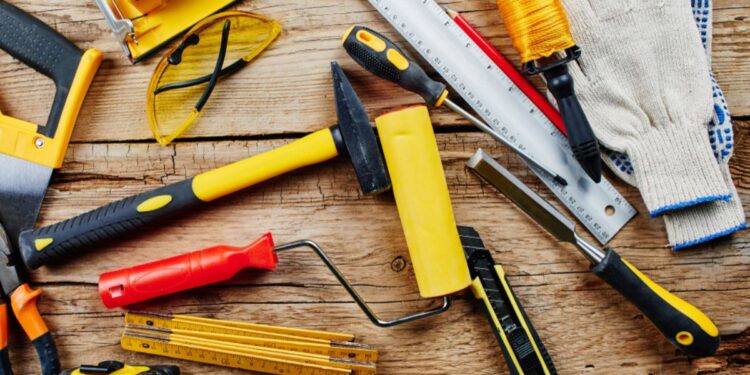Delve into the world of residential construction with a focus on the essential tools that make it all possible. From precise measurements to intricate finishing touches, this guide unveils the key instruments that shape every project.
Explore the realm of construction tools and discover how they contribute to the creation of sturdy and beautiful homes.
Tools for Measuring and Layout
In residential construction, tools for measuring and layout play a crucial role in ensuring accuracy and precision throughout the building process.Tape measures, levels, and squares are essential tools used by construction professionals to measure distances, check for level surfaces, and create perpendicular angles.
These tools help in ensuring that all components of a structure fit together correctly and that the final result meets the required specifications.
Importance of Tape Measures
Tape measures are used to accurately measure distances, such as the length of walls, the width of windows, or the height of ceilings. By using a tape measure, construction workers can ensure that all dimensions are precise, leading to a well-built and structurally sound building.
Utilizing Levels for Accuracy
Levels are crucial for checking if surfaces are horizontal or vertical. This is essential for ensuring that walls, floors, and ceilings are level, which is vital for the overall stability and appearance of a structure. By using a level, construction workers can avoid uneven surfaces that could lead to structural issues down the line.
Significance of Squares in Construction
Squares are used to create perfect right angles, ensuring that corners are square and components fit together seamlessly. This precision is vital in preventing gaps and inconsistencies in the construction process, leading to a more professional and visually appealing final result.By emphasizing precision and accuracy when using measuring and layout tools, construction professionals can guarantee that the building meets all necessary standards and regulations, providing a safe and well-constructed space for occupants.
Tools for Cutting and Shaping
When it comes to residential construction, having the right cutting and shaping tools is essential for various tasks. These tools help in shaping materials to fit specific dimensions, creating precise cuts, and ensuring a professional finish.
Saws
Saws are versatile cutting tools used in residential construction for cutting through different materials such as wood, metal, and plastic. They come in various types, including handsaws, circular saws, and jigsaws, each designed for specific cutting needs.
- Handsaws: Ideal for cutting wood and smaller materials by hand, providing more control and precision.
- Circular Saws: Perfect for making straight and accurate cuts in larger materials like plywood and lumber.
- Jigsaws: Used for cutting intricate shapes and curved lines, making them suitable for detailed work.
Utility Knives
Utility knives are handy tools for cutting materials like drywall, insulation, and flooring. They feature sharp retractable blades that can be easily replaced when dull, ensuring clean and precise cuts.
Chisels
Chisels are tools used for shaping and carving wood by hand, making them essential for tasks like fitting joints, trimming edges, and detailing. They come in various sizes and shapes, each serving a specific purpose in woodworking.
Tools for Fastening and Joining
When it comes to residential construction, tools for fastening and joining play a crucial role in securely connecting different materials together. Common tools like hammers, screwdrivers, drills, and nail guns are essential for ensuring the structural integrity of various construction projects.
Hammers
- Hammers are versatile tools used for driving nails into wood, breaking objects apart, or shaping materials.
- There are different types of hammers such as claw hammers, framing hammers, and sledgehammers, each designed for specific tasks.
- Choose a hammer that feels comfortable in your hand and suits the type of fastening work you will be doing.
Screwdrivers
- Screwdrivers are used to insert and remove screws from various surfaces.
- There are different types of screwdrivers, including flathead, Phillips, and Torx, each suitable for different screw types.
- Ensure you have the right screwdriver size and type to avoid damaging the screws or the materials you are working on.
Drills
- Drills are essential for creating holes in different materials for fastening or joining purposes.
- There are corded drills and cordless drills, each offering unique advantages depending on the project requirements.
- Consider the type of material you will be drilling into and the size of the holes needed when selecting a drill.
Nail Guns
- Nail guns are power tools that can drive nails quickly and efficiently into various materials.
- There are different types of nail guns, including brad nailers, finish nailers, and framing nailers, each suitable for specific applications.
- Choose a nail gun based on the size of nails required, the material being fastened, and the scale of the project.
Tools for Finishing and Detailing
Tools for finishing and detailing play a crucial role in adding the final touches to residential construction projects. These tools help ensure a polished and professional look, enhancing both the aesthetics and quality of the final construction.
Sanders
Sanders are essential for smoothing out surfaces by removing imperfections, old finishes, or rough spots. They come in various types such as orbital sanders, belt sanders, and detail sanders, each serving different purposes. Sanders help create a smooth and even surface for painting or staining, improving the overall appearance and durability of the project.
Paint Brushes
Paint brushes are used to apply paint or stain to various surfaces, allowing for precise and detailed work. Different types of paint brushes, such as angled brushes, flat brushes, and detail brushes, are used for different areas and purposes. Using high-quality paint brushes ensures a smooth and even application, enhancing the visual appeal of the project.
Trowels
Trowels are commonly used for applying and smoothing materials such as mortar, concrete, or plaster. They help in achieving a uniform and professional finish, especially in areas like tiling, masonry, or drywall finishing. Trowels come in different shapes and sizes to suit different applications, providing versatility and precision in detailing work.
Conclusion
In conclusion, the tools discussed play a vital role in ensuring the success and quality of residential construction projects. With the right tools in hand, the possibilities are endless.
FAQ Insights
What are the safety measures when using cutting and shaping tools?
Always wear appropriate safety gear such as goggles and gloves, and ensure the tools are sharp and in good working condition to prevent accidents.
How do fastening tools differ in their applications?
Hammers are versatile for various tasks, screwdrivers are essential for screws, drills are used for creating holes, and nail guns provide quick and efficient fastening.
What challenges are commonly faced when using finishing and detailing tools?
Issues like uneven surfaces, paint drips, and trowel marks can arise, but proper technique and practice can help overcome these challenges.









